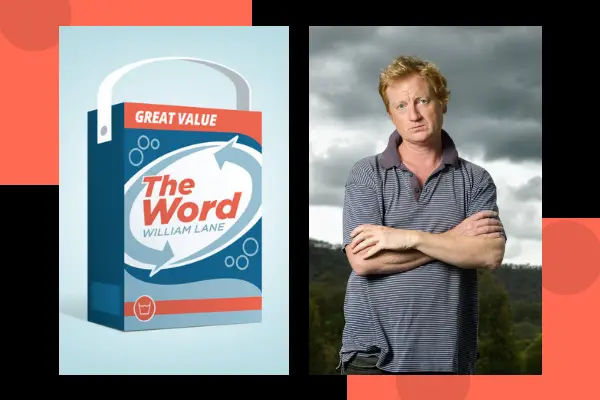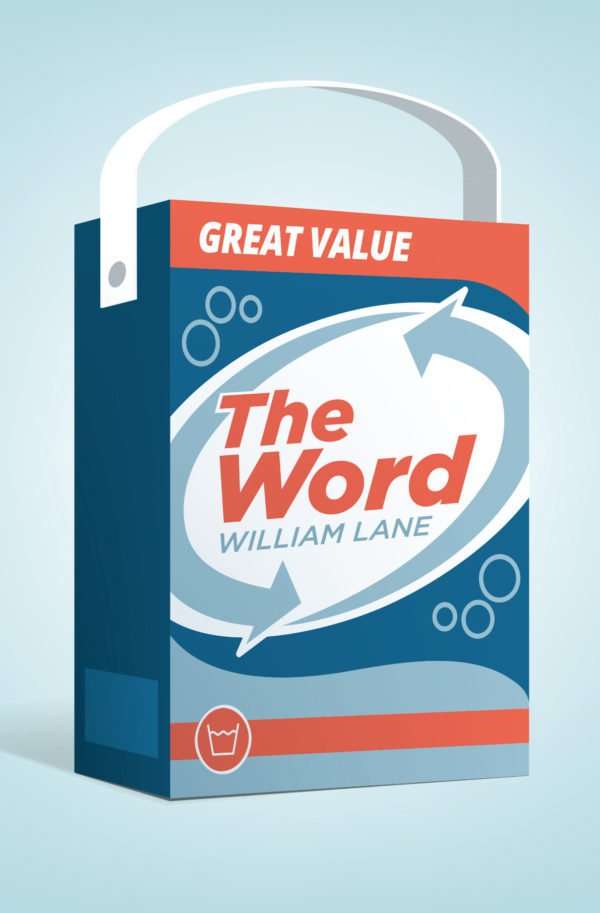THE WORD: William Lane on the inspiration for his new novel
Today we welcome author William Lane to discuss the inspiration for his latest novel The Word. You can also find our review of this title below.

Writing The Word
The idea for The Word occurred to me in the mid-1990s. I had found some decades-old knitting magazines. One magazine contained knitting patterns for men’s clothing. Each pattern was named for the type of man it might best suit – ‘Huntsman’, ‘Riverside’, ‘Sightseer’, ‘Vagabond’ – and so on.
I was struck by how gendered the language was, and how clumsy and ridiculous it seemed. Yet it was rich and funny and suggestive too, in its own way.
I began to create a character steeped in the language of advertising. This is Kenric, advertising man, protagonist of The Word, who is gifted at thinking up brand names and messages. What Kenric names, sells. But he grows disillusioned with using language merely to sell things. He senses broader possibilities in language, perhaps an ethics of language. He decides he no longer can work in advertising, and resigns from the firm where he has long been a star performer.
In this story of Kenric leaving the advertising world, I had tried to dramatise ideas of language, advertising and consumerism. It was a rather short piece of about 12 000 words, titled ‘The Word’.
There the story ended for twenty years. ‘The Word’ sat in my desk, and then various computers, year after year. I knew it was not finished because it was still restless with unsatisfied energy and unanswered questions. But I could not find a way forward to complete it.
I kept returning to the manuscript, however. I could not avoid thinking about advertising and its role in our consumerist society – who can avoid advertising? Even as a young child, I had always disliked advertising. I remember being especially irritated by the advertisements on television. It wasn’t just that they interrupted Maxwell Smart or Hogan’s Heroes or Bewitched. Some of the advertisements literally shouted at you. I didn’t like that. Others tried to get your attention in a nudge-nudge, wink-wink way. Others clearly incited envy. Even as a young child I felt advertising was not only irritating, it was manipulative. It was conditioning. And it assumed things about its target – the one-size-fits-all consumer – that I instinctively resisted.
In ‘The Word’, I knew I had begun, but not finished, a story to articulate these feelings and thoughts.
Over the years I tried extending the story in various ways, but none of them rang true.
The way forward appeared a few years ago when I realised the story could address not only language in advertising, but language more broadly – language in all discourse, public and private. Suddenly the character Kenric began to grow, to not only critique language in advertising, but language in general. In the middle and latter sections of the story, which was becoming a novel, Kenric formed a community of like-minded souls – souls disenchanted with the assumptions and dictates of the advertising world. The community he founds, The Word, not only rejects the language of advertising, but the materialism and consumerism that feed, and depend on, advertising.
In part, I drew upon personal experience in depicting the community of The Word. When I was nine, a close member of my family joined an idealistic community that vehemently rejected consumerism and materialism.
In writing The Word, I was trying to address questions that had long nagged me. The play of ideas is central to the novel. This may not be obvious at first, however, as the ideas are contained in humour, characterisation and incident. In this way, The Word is a Trojan horse. But perhaps all novels are.
– | –
Disclosure: If you click a link in this post we may earn a small commission to help offset our running costs.
Sign up to our Booklover Book Reviews emails and receive our gift for new subscribers. LEARN MORE >>
 The Word Synopsis
The Word Synopsis
William ‘s Lane’s disarming new novel, The Word, brilliantly satirises the ways in which we use language to define our lives. Kenric is an oddball advertising eccentric who possesses an unusual gift for language. The brands he names, sell. Yet he comes to believe advertising uses language too cynically. He is inspired by Maria to abandon the corporate world and establish a small residential community called The Word. The idealistic community relocates from Pittwater to a warehouse in industrial Mount Druitt, gathering about it others concerned with the misuse of language.
The Word is both a charming ensemble piece of unforgettable characters, and an astute and humorous exploration of the ways in which language beguiles and creates connections, but also misleads. Lane understands the human tendency to seek answers and directions in the unlikeliest of individuals but is happy to show us the folly of doing so. As such the novel parallels current world trends while evoking with candour Sydney’s watery beauty and suburban harshness.
(Transit Lounge Publishing, 1 September 2018)
BOOK REVIEW
Many will find themselves disillusioned by corporate greed (or at least grappling with the ethics of commercial enterprise) and in that context the best application of one’s time and energies, at one time or another. In The Word, Lane has taken a very interesting, and extreme slant on those moments of mental inquisition.
He believed every word contained multiple inherent echoes, much as a shell contained the ocean’s roar. According to Kenric, a word’s power lay in releasing these echoes at the moment of its use.
Much clever wordplay is woven into the fabric of entertaining, often cutting dialogue between this group of odd-bods, ostensibly brought together by a united cause or viewpoint, the manipulation of language. But many have secrets and motivations far less altruistic, and exert power in the group dynamic by chipping away at others insecurities.
Lane highlights that while we seek to make it a communal affair, at its core the search for meaning and fulfilment is a very personal quest… what inspires and motivates us ebbs and flows over time, change the only certainty.
The Word is an accessible yet thought-provoking read.
Get your copy of The Word from:
Genre: Literature, Drama
This review counts towards my participation in the Aussie Author Challenge 2018 and the 2018 New Release Challenge.
About the Author, William Lane
William Lane lives in the Hunter Valley, NSW, where he is raising three children. After completing an Honours degree in Australian literature, he travelled and worked in a number of different jobs. In addition to reading and writing, his interests include music and education. He has completed a doctorate on the Australian writer Christina Stead, and has had several critical articles on Stead published in literary journals. He is the author of three other novels: Over the Water (2014) and The Horses (2015) and The Salamanders (2016). An earlier and different manuscript version of The Salamanders (titled An English Girl) was shortlisted for the Vogel Prize. An earlier version of The Salamanders also won a Varuna Litlink Fellowship in 2010.
